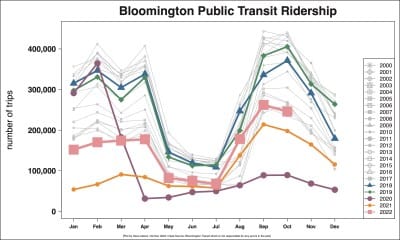Public bus notebook: BT to work with Go Bloomington on guaranteed rides home

Bloomington Transit’s five-member board has approved in concept the idea that the Go Bloomington program will tap into BT’s existing arrangements with Uber and Lyft, to give program participants a guaranteed ride home.

Go Bloomington is the branding that’s been adopted for the city’s transportation demand management program. The idea is to help participants find other ways to get to work, besides driving a car by themselves.
The idea behind a “guaranteed ride home” feature is that someone might be more inclined to take the public bus, bicycle, or walk to work—if they know that they have a backstop for any unexpected transportation need.
If someone’s day unfolds in an unexpected way, they’ll be able to use a voucher with Uber or Lyft to handle whatever scenario has come up.
What the BT board approved at last Tuesday’s monthly meeting was a motion to authorize BT general manager John Connell to develop the interlocal agreement that’s needed, in order to make sure that BT gets reimbursed by Go Bloomington for the cost of the rides.
At BT’s Tuesday board meeting, Bloomington’s transportation demand manager Jeffrey Jackson said the cost of the additional Uber and Lyft rides is expected to be no more than $16,000. Jackson said that Go Bloomington could strike a direct deal with Uber, but he thought it would make sense to take advantage of the existing relationship that BT has with transportation network companies.
That interlocal agreement between Go Bloomington and BT is supposed to be ready for the board’s approval at its December meeting.
Another item that could be ready for the board’s approval next month is the interlocal agreement between the city of Bloomington and BT for the city’s allocation to BT of around $4 million of new local income tax revenue, to expand service along an east-west corridor.
That topic of geographic service expansion drew some board discussion last Tuesday along the lines of extending BT service beyond the Daniels Way location, which had been the subject of an early-September city council resolution.
About the idea of pitching the city council to expand service countywide, BT board member Doug Horn drew an analogy, where the extension of service to Daniels Way is one cookie. “Moving forward, we don’t want to get in a position where we’ve gotten an approval from mother for one cookie, and now ask for the cookie jar.”
The relationship between BT and the transportation network companies, Uber and Lyft—which Go Bloomington wants to leverage—is still in the form of a pilot program. BT is using a voucher system with Uber and Lyft to replace late night service on some routes and to replace service at all times of the day on the east side of town. The eastside service was previously provided by Route 8, which was discontinued.
The Uber and Lyft voucher program is generically called microtransit. It’s branded as BT Late Nite and Eastside On-Demand. The update on the microtransit program, which was provided by BT’s planning and special projects manager Zac Huneck at Tuesday’s meeting, showed about $40,000 worth of ride subsidies paid by BT for the month of October.
One stat that BT board members care about is the cost per ride—if service were offered using big fixed-route buses. Based on previous B Square reporting, for the routes where late-night service was replaced with microtransit, the cost per fixed-route ride, starting around 9 p.m., had been around $10 to $12. But by 10 p.m. the cost went up to $13 or $15.
October’s operating stats show an average subsidy of $12.51 for rides taken with Lyft and $9.17 for rides taken with Uber.
Still, the $40,000 spent on subsidies for microtransit was a matter of some concern for board members. BT board member Kent McDaniel pointed out that $40,000 a month works out to about a half million dollars a year, more than the quarter million a year that BT has budgeted.
BT general manager John Connell responded by saying for 2023, there’s $350,000 budgeted for microtransit—more than the $250,000 McDaniel had remembered, but still less than would cover $40,000 a month.
Connell said that one of the options after the microtransit pilot period is to bring the on-demand service in-house, to be operated by BT employees with BT vehicles. But one barrier to that is finding drivers, Connell said.
On the general topic of BT’s ongoing driver shortage for fixed route buses, the update at Tuesday’s meeting was: Three new hires, but three drivers have left BT employment, for a net of zero, leaving nine vacancies.
Here’s breakdown of the three departures, provided by BT human resources manager Brenda Underwood: one because of health reasons; one because they could not find affordable housing; and the other because they took a job driving for IU campus bus services.




Comments ()